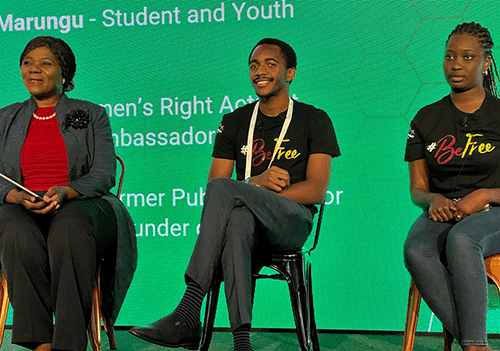Looking at statistics, most gender-based violence committed happens in intimate relationships and society has accepted violence between partners.
Sexual violence survivor Ellen Nanyeni said this at the One Young World Summit in Manchester, UK, recently.
Nanyeni, who was part of a group of five Namibians to represent Namibia at the summit, said: “We can safely say most (cases) are rooted in cultural beliefs. Paying lobola, for example, sort of ignites ownership by men on women”.
“We need to find a safe line where we still appreciate and celebrate culture while doing away with harmful practices, which highly contribute to SGBV (Sexual and gender-based violence).”
She then challenged the government and lawmakers to strengthen the laws to make sure perpetrators of sexual gender-based violence feel the full wrath of the law.
“Being a survivor of sexual gender-based violence, it was up to me to join the fight against sexual gender-based violence. I have been involved with movements and organisations that are leading or curbing sexual gender-based violence in Namibia,” said Nanyeni.
She is one of the young Namibians at the forefront of the #ShutItAllDown movement, a chain of protests by young Namibians condemning the surge of gender-based violence against women and children.
The delegates were selected based on leadership shown in social, technological, cultural or entrepreneurial initiatives, particularly in the fields of Covid-19, education, SGBV services, mental health, substance abuse and youth development.
Another panellist Andreas Marungu also shared his role in making a difference in Namibia.
He is part of the African Youth and Adolescent Network (AfriYan), which advocates for sexual reproductive health rights.
“We host campaigns, one that is called ‘Condomise’, where we provide a set of services and then education to our young people in the country,” he explained.
Looking at the high number of teenage pregnancies, Marungu said: “We have more than 60% of young people in the country – and of this number, you still have a very high rate of teenage pregnancy. This is worrying.”
For young leaders, the summit was a chance for individuals responsible for shaping the future of the world to come together to confront the biggest challenges facing humanity.
Thuli Madonsela, an advocate, professor of law and former South African former public protector, moderated the discussion.
The annual One Young World Summit brings together more than 2 000 of the brightest young leaders from every country and sector, working to accelerate social impact in person and digitally.



